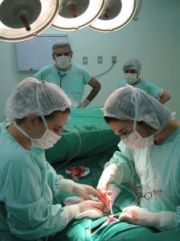Treatments for Lung Cancer
Options to Consider
| Treatments for lung cancer depend on the type, size, location, extent of progression and your general health. |
Various treatments include standard radiotherapy, proton beam radiation, surgery and chemotherapy. All types of treatment options come with their own pros and cons. That's why it pays to know everything about your options.
What are the different forms of treatments?
Your doctor will recommend among the treatment options based on the stage your tumor is in at the time of diagnosis. Treatments are stage-specific.
Related Article: Lung Cancer Stages: Why Staging Is Important
1. Surgery

Among the different treatments, surgery is not usually recommended if you are more than 50 years old and have other types of lung disease or another serious medical condition.
When is surgery recommended?
It is advised as. . .
How extensive the operation will be depends on the size and location of the tumor. There are also various ways of surgically removing the tumor in your lungs.
What are the different surgery options?
A tumor in the lungs can be surgically removed through a . . .
- Lobectomy
In lobectomy, the entire lobe of your lung where the tumor is located is removed. It is recommended when your lungs are fully functioning. Mortality risk is 3 to 4% and goes up if you are older
- Resection
This is recommended if your lungs are not fully functioning and if the tumor is still tiny and confined to a certain area such as at the edge of your lungs. It can be segmental or wedge resectioning.
Resectioning is done by removing the tumor and a small part of the tissues in your lungs that surround the tumor. Among the different surgery treatments, mortality risk for resectioning is much lower at 1.4%.
- Pneumonectomy
Among the surgical treatments for lung cancer, pneumonectomy has the highest mortality risk at 5 to 8%.
It involves the surgical removal of the entire lung affected by the tumor.
2. Radiation Therapy
Radiation treatment include 2 options: standard or conventional and proton radiation. In both treatments, energy rays are used to kill the tumor and to relieve some of the effects of lung cancer. These 2 options are recommended as . . .
- one of the primary treatments which can be administered alone or with chemotherapy,
- pre-surgery treatment to shrink the tumor,
- post surgery treatment to remove malignant cells that might have been missed during the surgery, and
- one of the treatments for metastatic tumor that has spread to the brain and other organs.
Related Article: Proton Radiation: Is It the Best Treatment?
3. Chemotherapy
Chemotherapy and radiation treatments are recommended for small cell lung cancer or SCLC because together, these options are more effective. However, serious side effects from combination of these treatments can also occur.
Chemotherapy involves the use of medicines given either through direct injection into a vein or a catheter put into a large vein to kill cancerous cells.
It is also usually administered after surgery to destroy any cancerous cells that cannot be or have not been removed.
It can be given during all the stages of tumor in the lungs for the prevention of its growth and relief of symptoms especially if you can't be operated on.
Reference: Radiology Info.org
Any of these possible treatments for lung cancer will have its side effects. Awareness of the side effects you can expect from these treatments is a must. It's up to you, your doctor and your family to weigh the pros and cons of the available treatments for lung cancer.
What would you like to read next?
What Causes Lung Cancer
Warning Signs of Lung Cancer
Options on How to Prevent Lung Cancer
Return from Treatments for Lung Cancer to Facts About Lung Cancer
Return from Information on Lung Cancer Treatments to Prevention Home
Looking for something? Use Google Search box to find it! |
 Ganoderma Extract Supplements |
Popular Pages On Cancer Prevention Alkaline Foods Against Tumor How Does Sunscreen Work Sun Protection Clothing Benefits of Anti-Inflammatory Foods |
 How I built my site and how it is changing my life. |





